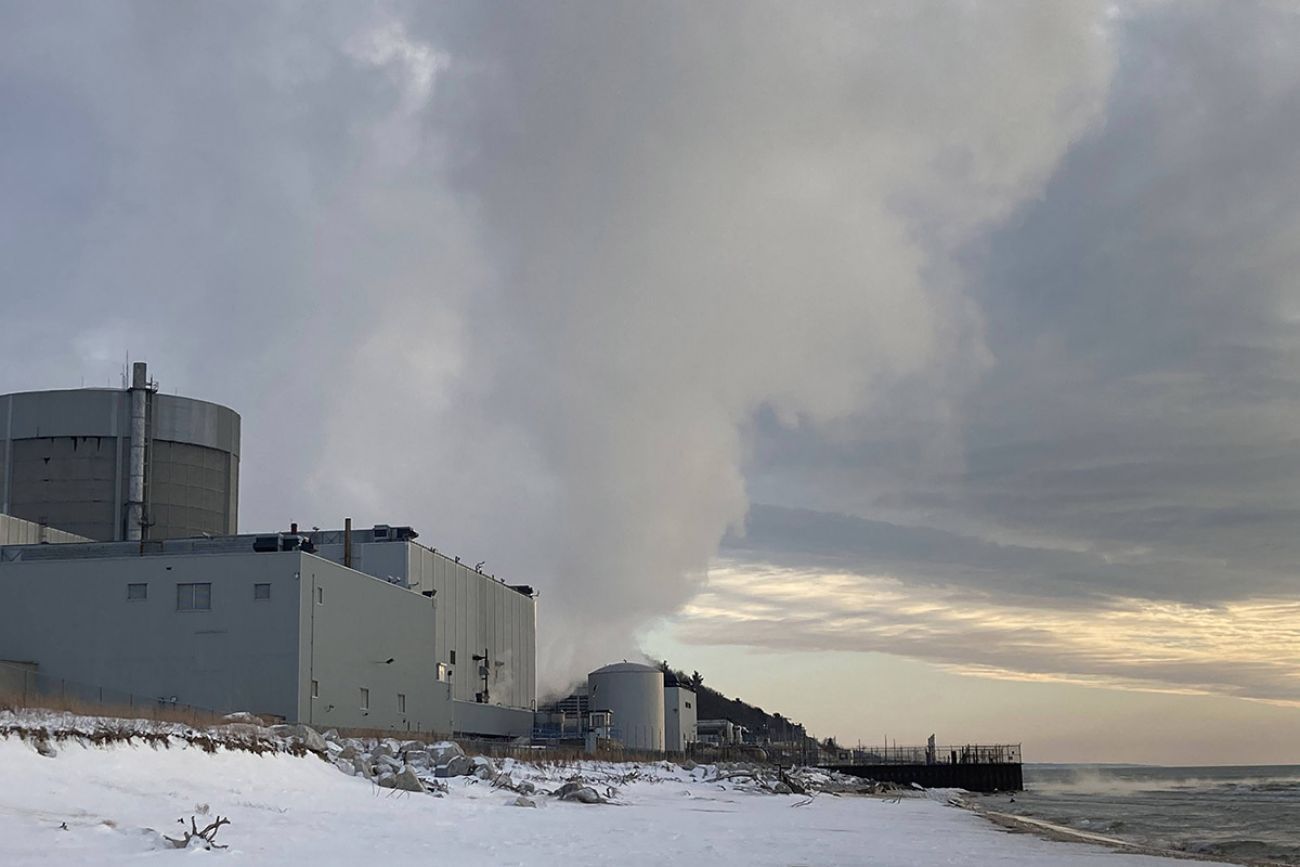Feds deny funding to reopen Michigan’s Palisades nuclear plant

- The Palisades nuclear plant closed in May, eliminating enough emissions-free electricity to power 800,000 homes
- Lawmakers and regulators had hoped to reopen the plant with federal grant money
- Federal regulators denied the request, setting Michigan back on its climate goals
The federal government has denied Holtec International’s request for funds to reopen the shuttered Palisades nuclear power plant, likely cementing the southwest Michigan plant’s permanent closure.
In an emailed statement, Holtec spokesperson Pat O’Brien said the company is now focused on decommissioning Palisades “to allow for potential reuse.”
While the closure of the plant on Lake Michigan was “not the outcome many had hoped for,” O’Brien said the company “fully understood that what we were attempting to do, re-starting a shuttered nuclear plant, would be both a challenge and a first for the nuclear industry.”
Related:
- Fresh off Palisades closure, Michigan will study state’s nuclear prospects
- Gretchen Whitmer: Federal grant could keep open Palisades nuclear plant
- Nuclear power is having a moment in Michigan after Palisades
- Owner says Palisades nuclear plant closed for good. Michigan has other ideas
The federal government’s decision was met with celebration by anti-nuclear activists who argued the aging plant posed a meltdown risk, and disappointment by others who worry the plant’s early closure will set Michigan back in its effort to go carbon neutral.
A spokesperson for the U.S. Department of Energy, which oversees the $6 billion Civil Nuclear Credit Program to bail out financially struggling nuclear plants, declined to comment.
A spokesperson for Gov. Gretchen Whitmer, who had lobbied for federal funds to keep the plant open, called the failed bid a “temporary setback.”
“Governor Whitmer will continue competing to bring home transformational projects creating thousands of good-paying jobs to our state in autos, chips, batteries, and clean energy,” spokesperson Bobby Leddy said in a Monday email to Bridge Michigan.
The federal government structured the first round of grants from the $6 billion fund to specifically target Palisades and California’s Diablo Canyon plant. The latter received $1.1 billion to stay open, but Palisades was considered a longer shot for rescue because its shutdown process had already begun.
Its former owner, Entery, closed the 51-year-old plant ahead-of-schedule in May, after an issue with a “control rod drive seal.” It then transferred ownership to Holtec, which is responsible for decommissioning the plant and storing its spent fuel.
The closure immediately removed 800 megawatts of emissions-free power from Michigan’s grid (enough to power 800,000 homes), at a time when scientists warn society needs to rapidly decarbonize its energy sources to avoid the worst consequences of climate change.
Consumers Energy, which had purchased power from Palisades, told Bridge at the time that it planned to offset the power from Palisades with a mix of renewables, natural gas, coal and power purchased from outside providers.
Holtec announced in September that it had applied for funding to reopen the plant, with support from Gov. Gretchen Whitmer, bipartisan lawmakers, and state regulators who hoped to revive the plant’s 600 jobs and vast power-generating capacity.
“Keeping Palisades open will keep energy costs low, shore up domestic energy production, and increase Michigan’s competitiveness for future economic development,” Whitmer said at the time.
Anti-nuclear activists disagreed. In a letter to U.S. Energy Secretary Jennifer Granholm, they raised questions about the wisdom of spending billions of taxpayer dollars to prolong the life of a plant with a history of safety violations. And they argued the plant was ineligible for funding, because the Civil Nuclear Credit Program was not designed to bail out plants that had already closed.
Kevin Kamps, a radioactive waste specialist for the group Beyond Nuclear, cheered the Energy Department’s rejection of Holtec’s funding request in a statement Sunday.
“We are again thankful that this reactor has indeed been shut down before it melted down,” Kamps said.
Holtec is considering the possibility of eventually reusing the Palisades site for a new small modular nuclear reactor, and anti-nuclear activists say they oppose those efforts.
Michigan Environment Watch
Michigan Environment Watch examines how public policy, industry, and other factors interact with the state’s trove of natural resources.
- See full coverage
- Subscribe
- Share tips and questions with Bridge environment reporter Kelly House
Michigan Environment Watch is made possible by generous financial support from:
Our generous Environment Watch underwriters encourage Bridge Michigan readers to also support civic journalism by becoming Bridge members. Please consider joining today.
See what new members are saying about why they donated to Bridge Michigan:
- “In order for this information to be accurate and unbiased it must be underwritten by its readers, not by special interests.” - Larry S.
- “Not many other media sources report on the topics Bridge does.” - Susan B.
- “Your journalism is outstanding and rare these days.” - Mark S.
If you want to ensure the future of nonpartisan, nonprofit Michigan journalism, please become a member today. You, too, will be asked why you donated and maybe we'll feature your quote next time!






